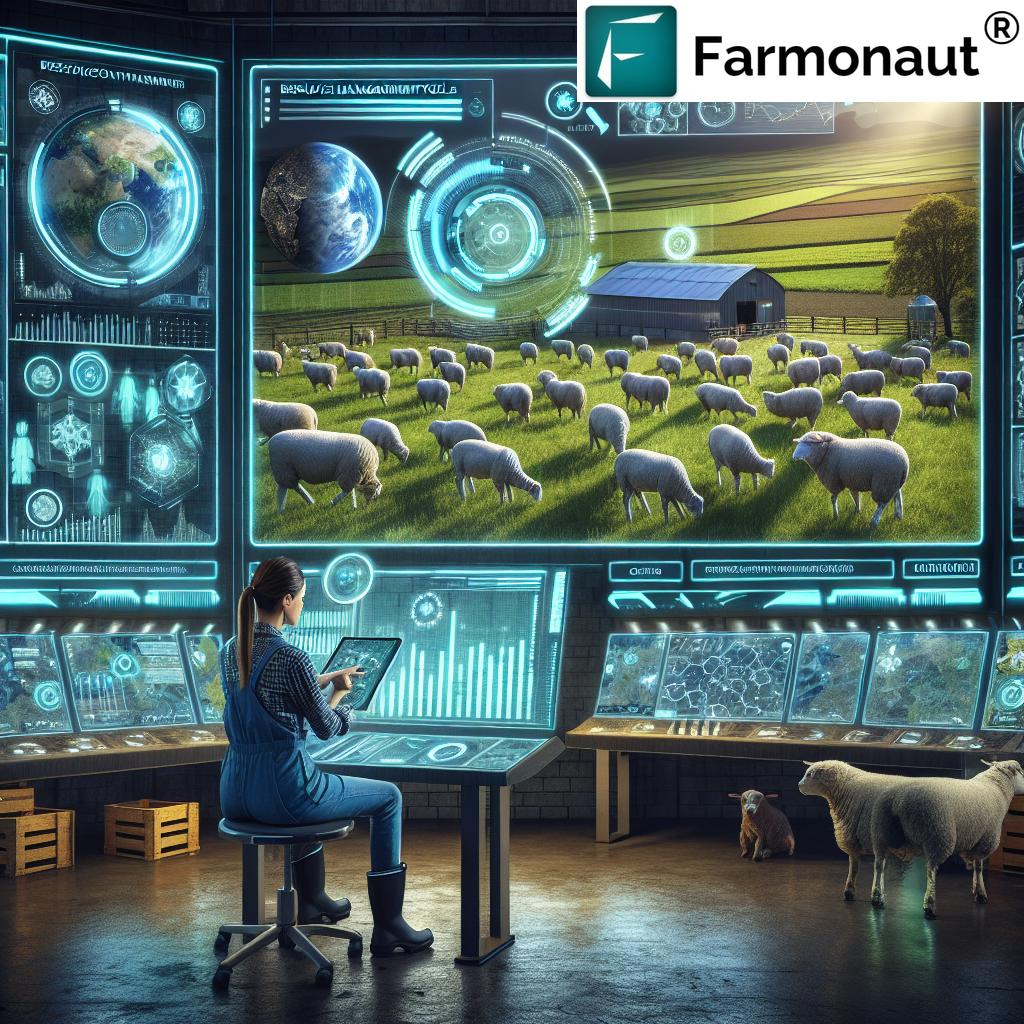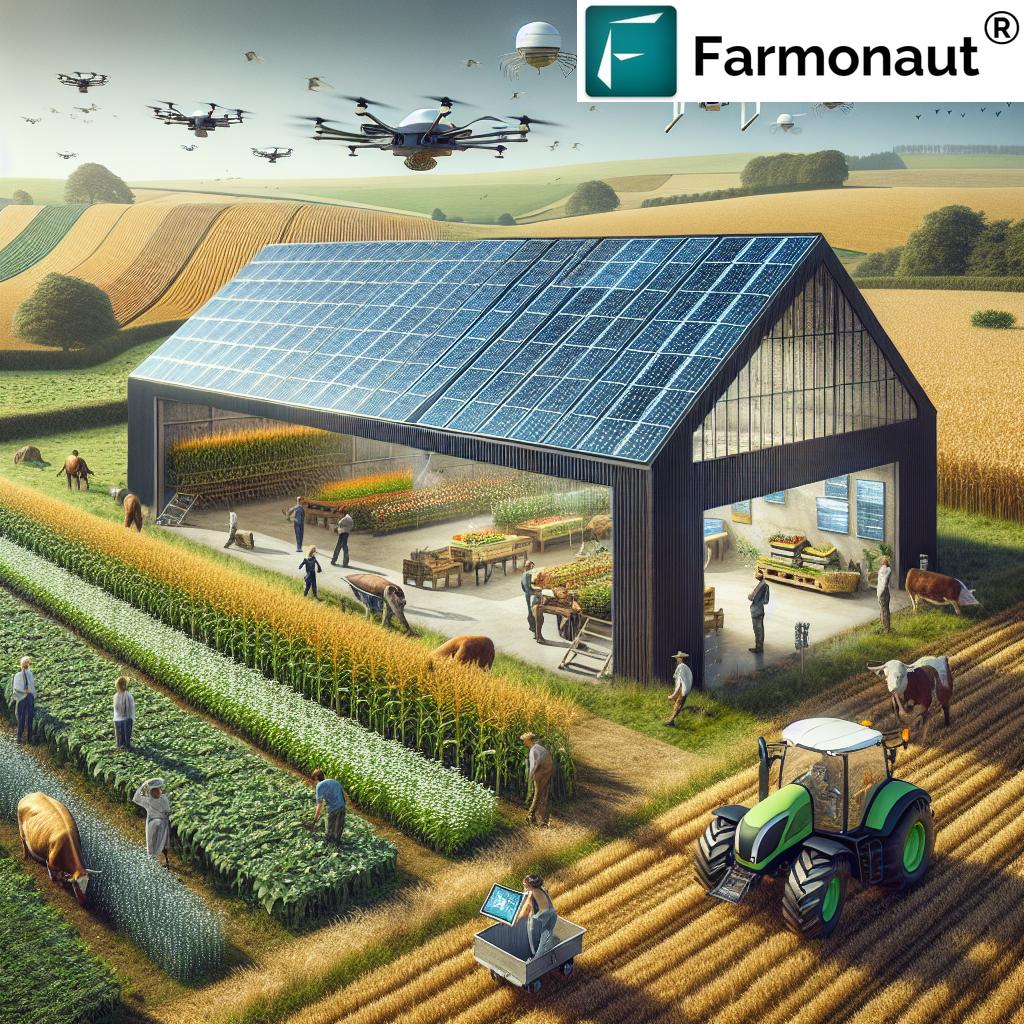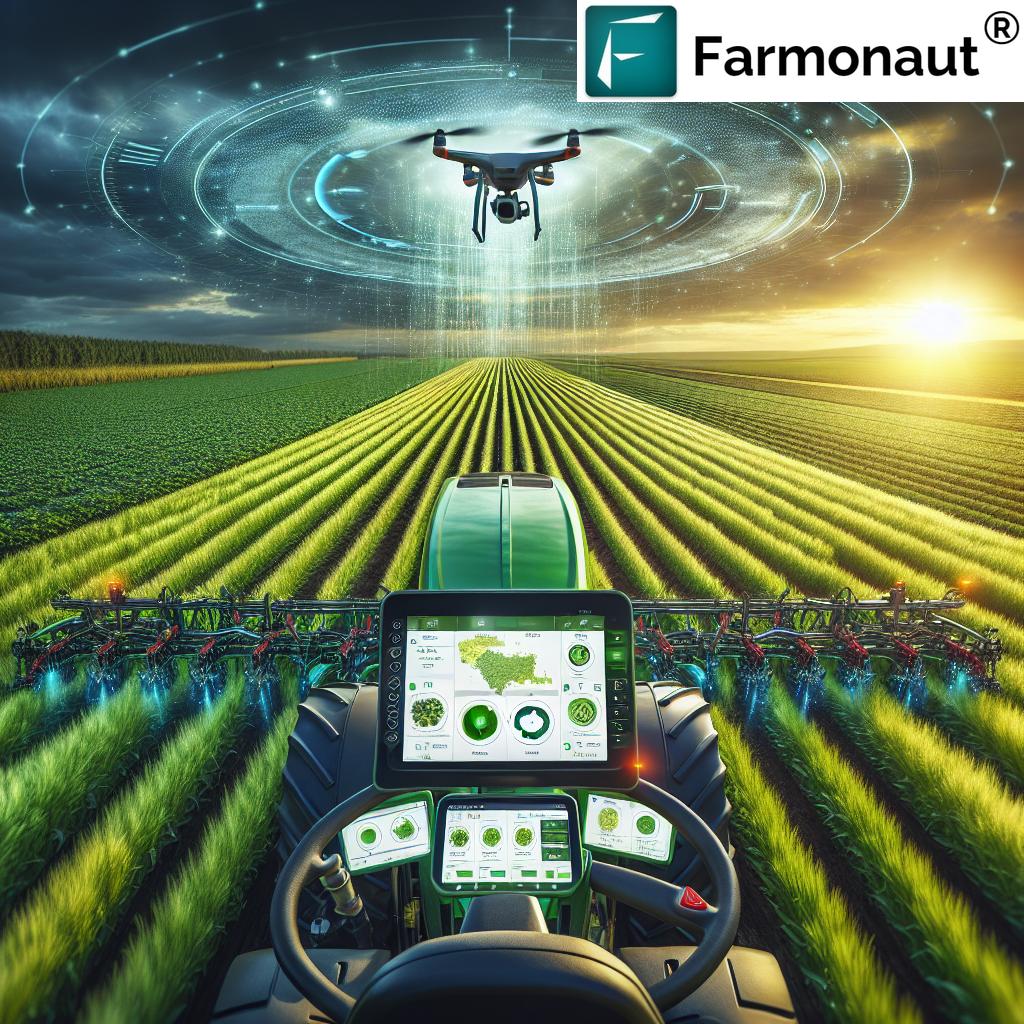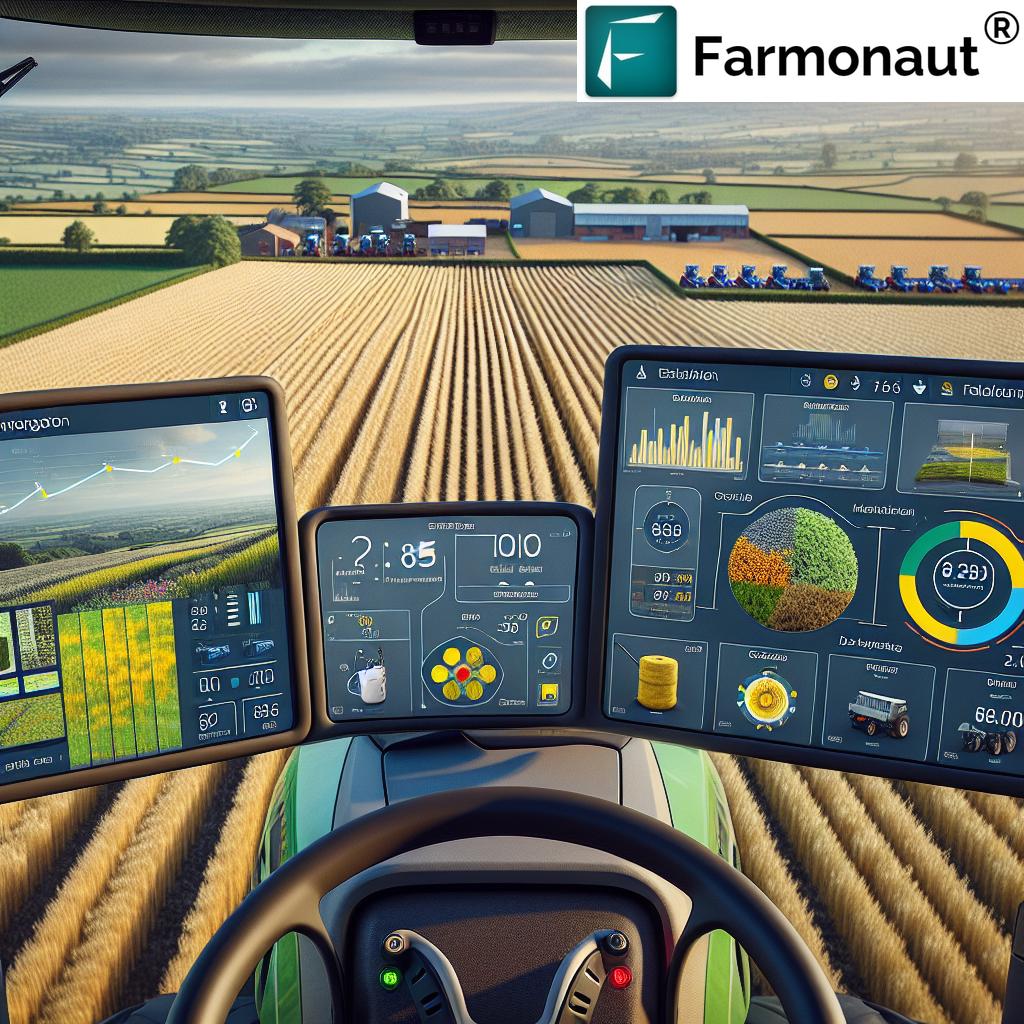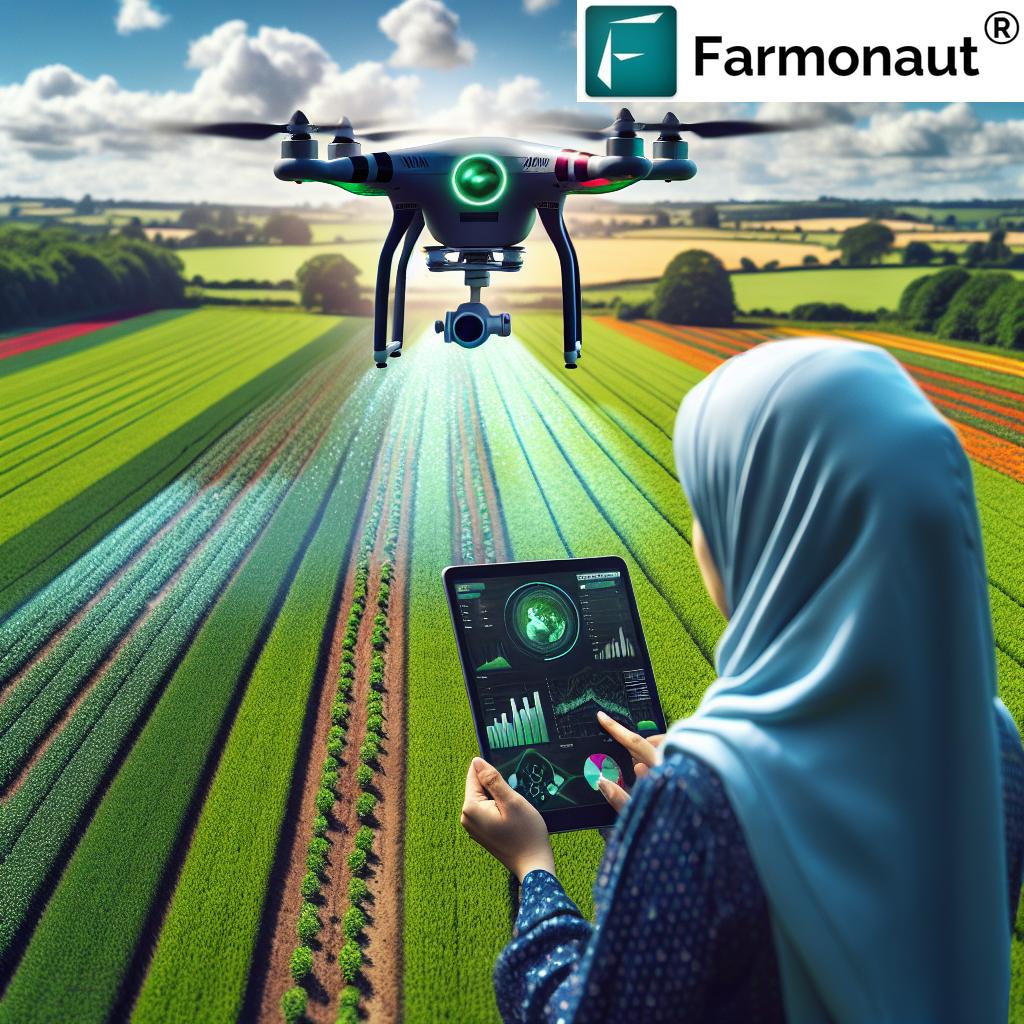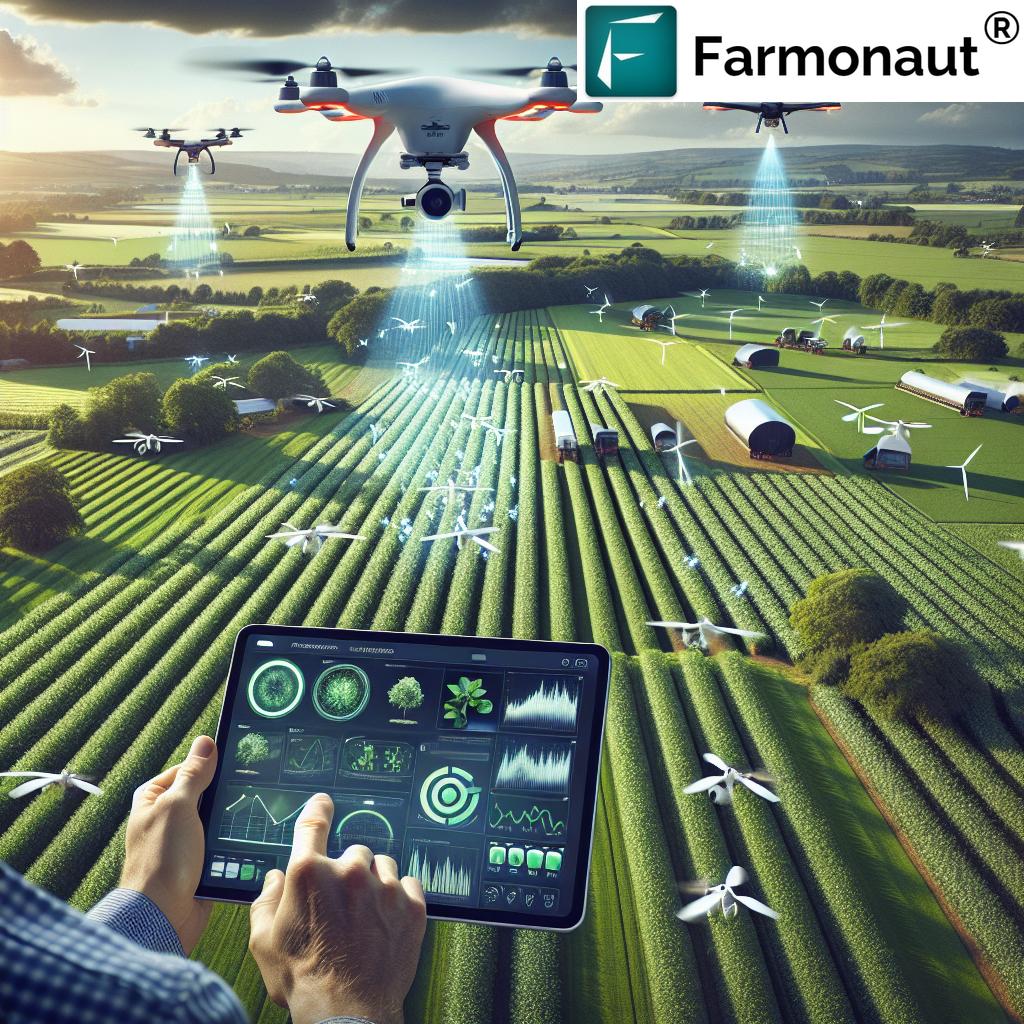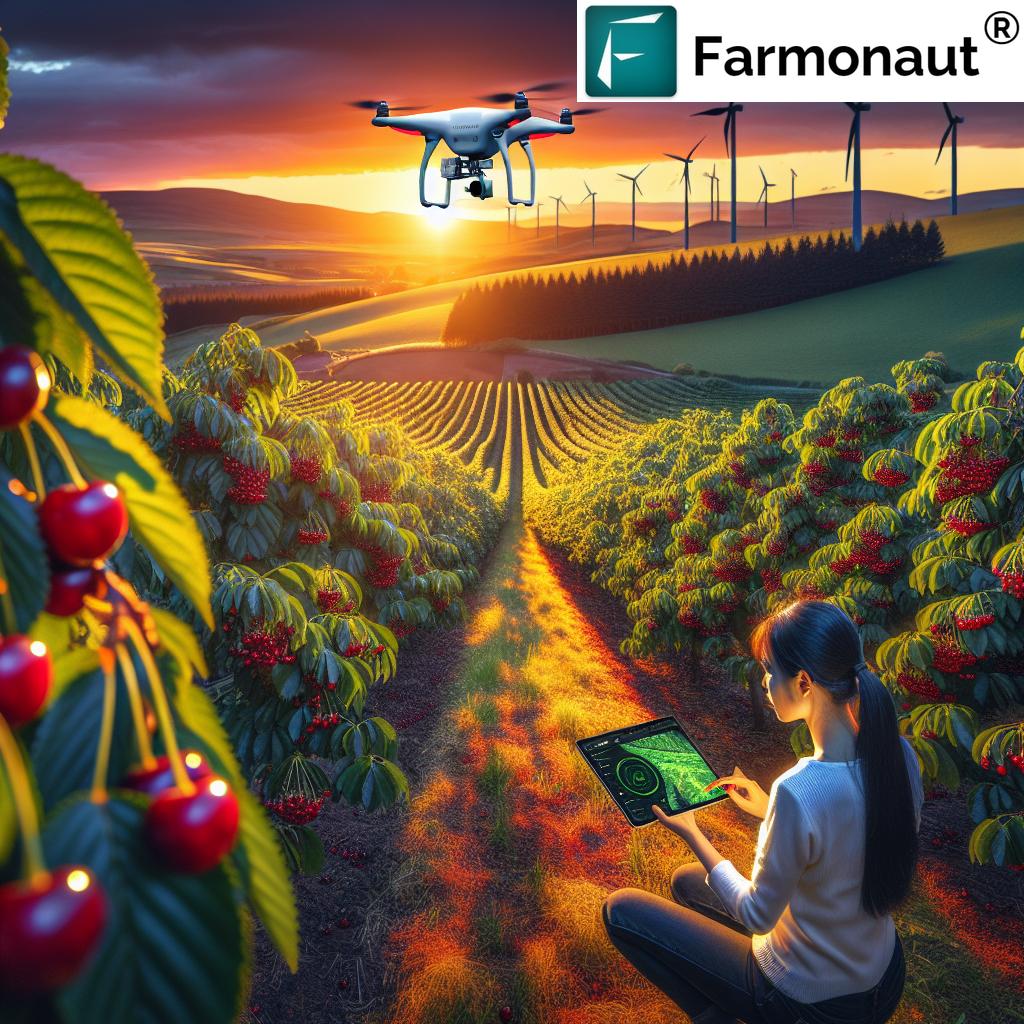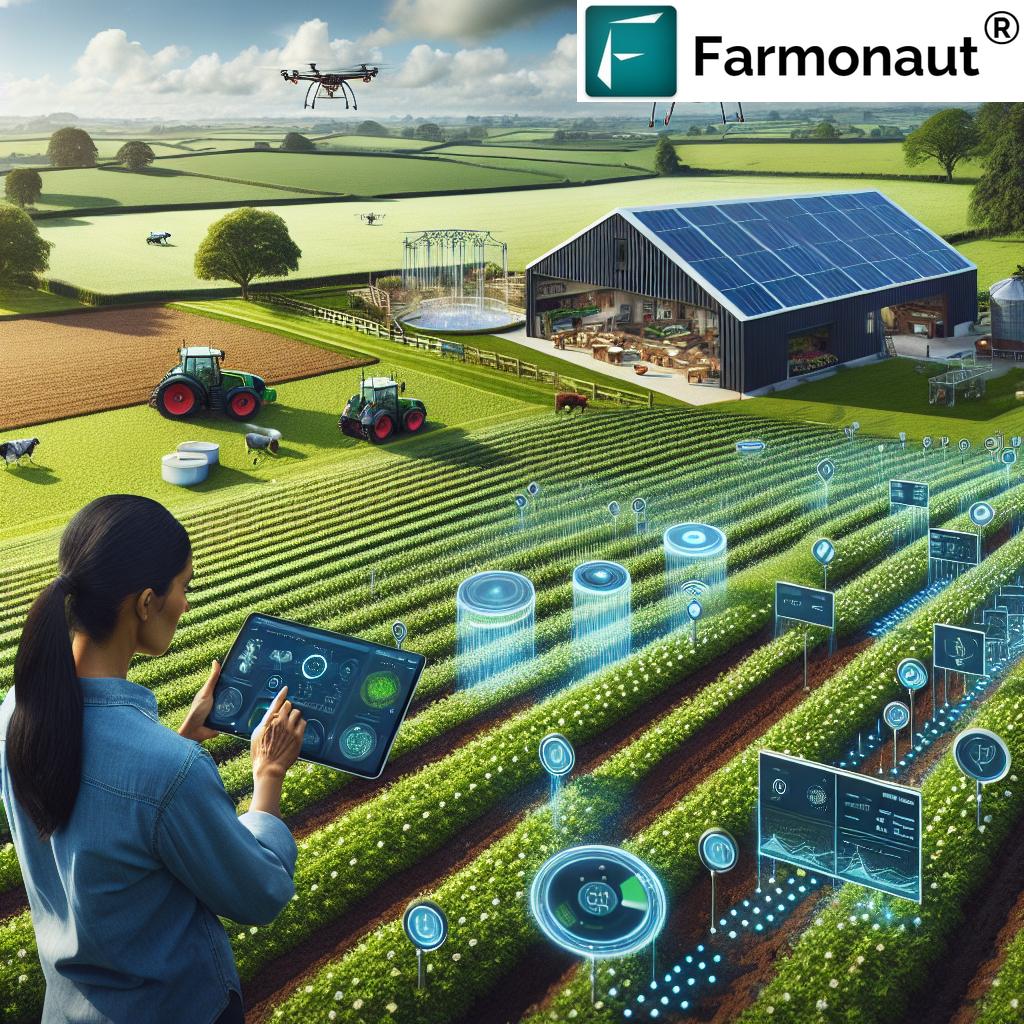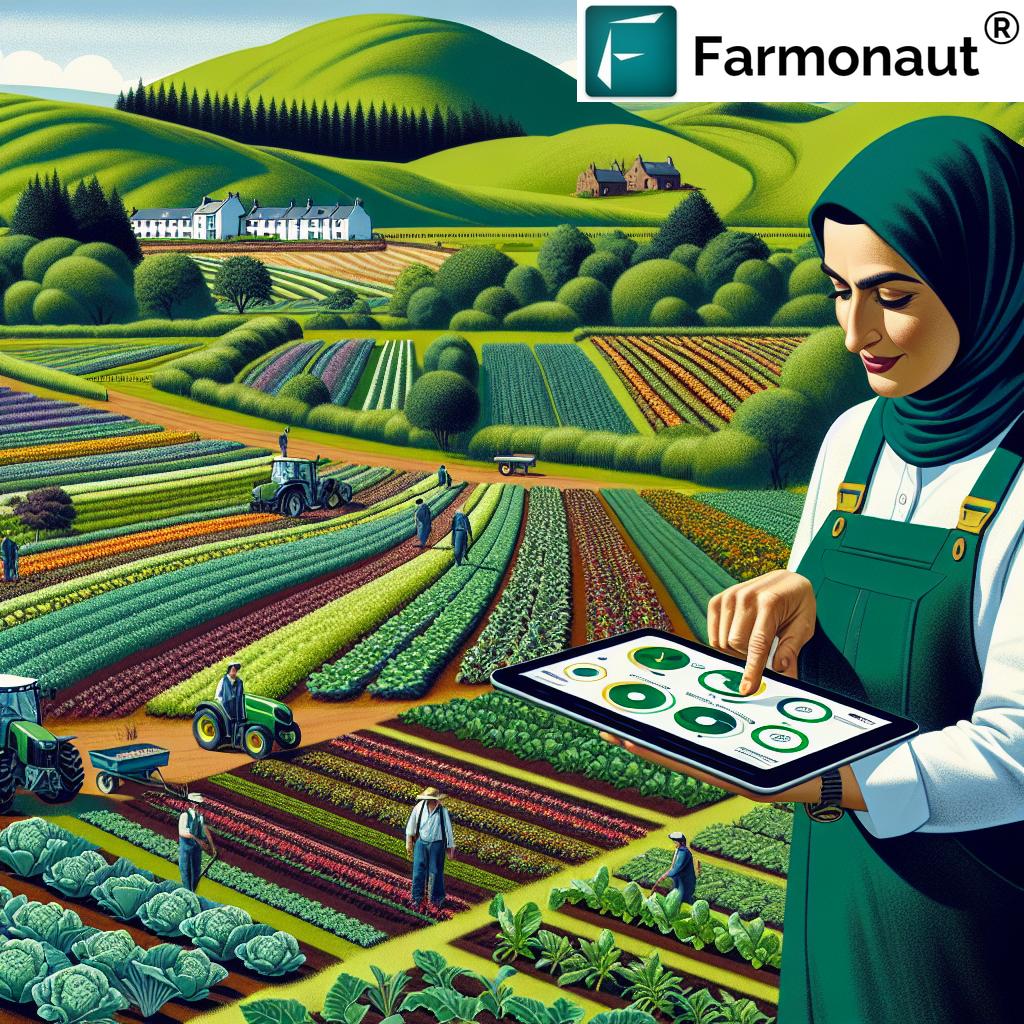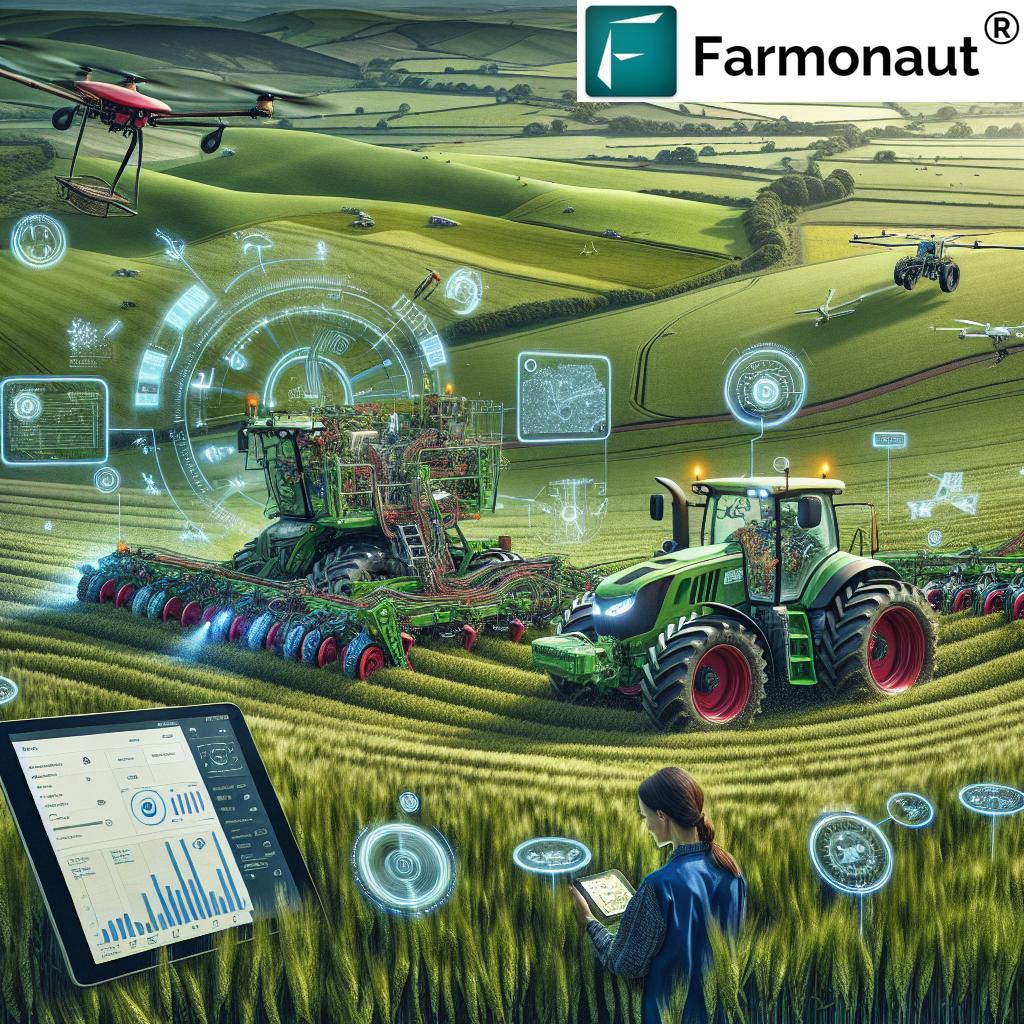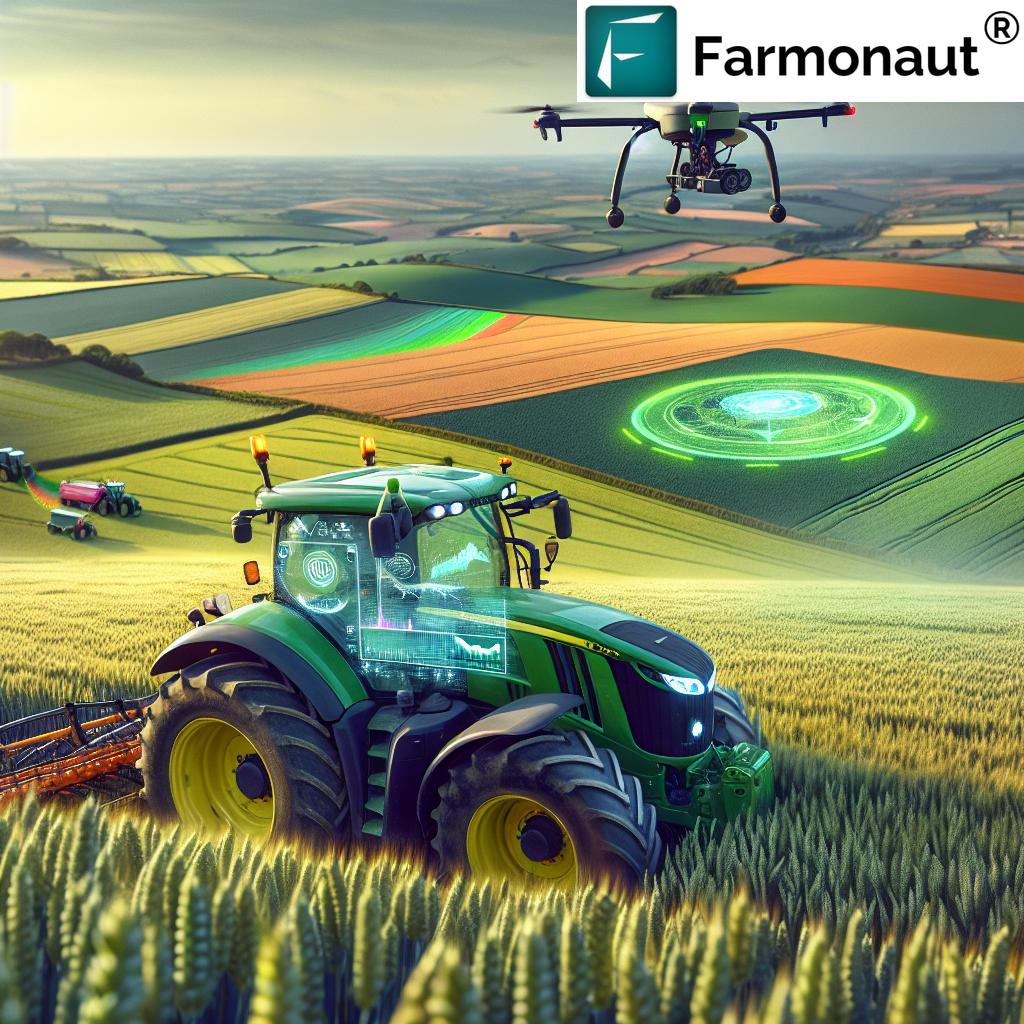UK Food Supply Chains at Breaking Point: How Farmonaut’s Agritech Solutions Enhance Agricultural Resilience
“UK farmers face a triple threat: 40% of farms lack successors, 67% struggle with labour shortages, and 50% report equipment challenges.”
In the face of unprecedented challenges, the United Kingdom’s food supply chains are teetering on the brink of a crisis. As we delve into the complexities of modern farming practices across England, Scotland, and Wales, we uncover a landscape fraught with hurdles that threaten not only the livelihoods of our farmers but also the very fabric of our nation’s food security. From labour shortages to equipment innovations, from climate change to market volatility, UK agriculture is at a crossroads. However, amidst these challenges, innovative agritech solutions are emerging as beacons of hope, offering pathways to enhanced resilience and sustainability.
In this comprehensive exploration, we’ll examine the pressing issues affecting farms, crop production, and livestock management across the UK. We’ll also unveil how cutting-edge technologies, including Farmonaut’s precision agriculture solutions, are reshaping the landscape of arable and grassland management. Join us as we navigate through the complexities of agricultural policy reform, market trends, and the transformative power of smart farming technologies in ensuring a stable food supply for the nation.
The Current State of UK Agriculture: A Sector Under Siege
The agricultural sector in the UK is facing a perfect storm of challenges that threaten its very foundations. Let’s break down the key issues:
- Labour Shortages: Post-Brexit policies and the COVID-19 pandemic have exacerbated the already significant labour shortages in the farming sector. Many farms, particularly those relying on seasonal workers for harvest, are struggling to find adequate manpower.
- Succession Crisis: With 40% of farms lacking clear successors, the future of many family-run agricultural operations hangs in the balance.
- Equipment and Machinery Challenges: Half of UK farms report difficulties in acquiring or maintaining essential equipment, from tractors and sprayers to combines and cultivators.
- Market Volatility: Fluctuating commodity prices and uncertain trade agreements post-Brexit have created a challenging economic environment for farmers.
- Climate Change: Extreme weather events, changing precipitation patterns, and rising temperatures are affecting crop yields and livestock management across the country.
These challenges are not isolated; they interweave to create a complex tapestry of obstacles that UK farmers must navigate daily. The repercussions extend far beyond the farm gate, threatening the stability of our food supply chains and, by extension, our national food security.
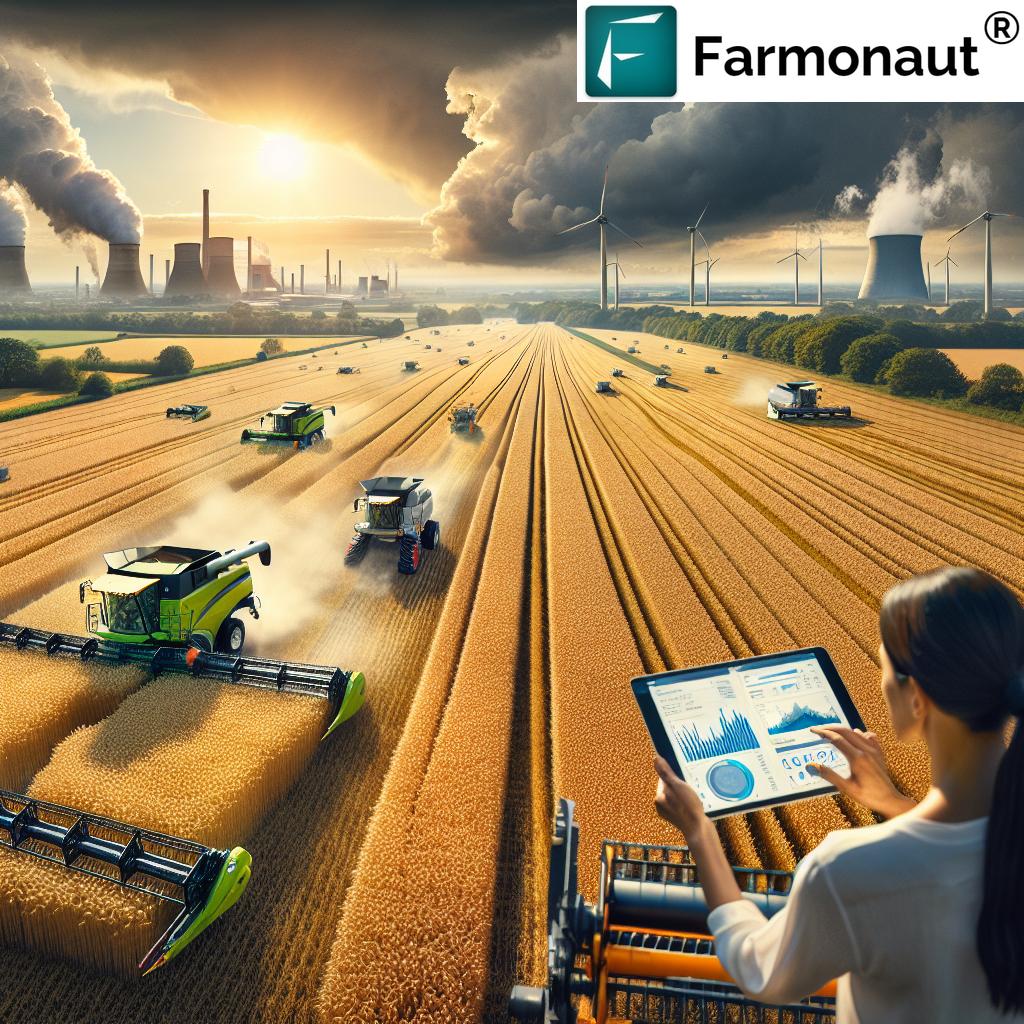
The Impact on UK Food Supply Chains
The challenges facing UK agriculture have far-reaching consequences for our food supply chains:
- Reduced Domestic Production: Labour shortages and operational difficulties are leading to reduced crop yields and livestock output.
- Increased Reliance on Imports: As domestic production falters, the UK is becoming increasingly dependent on food imports, raising concerns about food sovereignty and security.
- Supply Chain Disruptions: From farm to fork, every link in the supply chain is under pressure, leading to potential shortages and price volatility in supermarkets.
- Quality Concerns: Rushed harvests due to labour shortages can lead to compromised product quality, affecting both domestic consumers and export markets.
- Environmental Impact: The struggle to maintain productivity may lead some farmers to adopt unsustainable practices, potentially harming long-term soil health and biodiversity.
These impacts underscore the urgent need for innovative solutions that can help stabilize and strengthen UK food supply chains. This is where advanced agricultural technologies come into play, offering hope for a more resilient and sustainable future.
Farmonaut: Pioneering Agritech Solutions for UK Agriculture
In the face of these daunting challenges, Farmonaut emerges as a beacon of innovation, offering cutting-edge agritech solutions designed to enhance agricultural resilience and efficiency. By leveraging advanced satellite technology, artificial intelligence, and data analytics, Farmonaut provides farmers and agribusinesses with powerful tools to optimize their operations and navigate the complexities of modern agriculture.
Key features of Farmonaut’s platform include:
- Satellite-Based Crop Health Monitoring: Real-time insights into vegetation health, soil moisture levels, and other critical metrics enable farmers to make informed decisions about irrigation, fertilizer usage, and pest management.
- AI-Driven Advisory System: Personalized recommendations based on satellite data and advanced analytics help farmers optimize their crop management strategies.
- Blockchain-Based Traceability: Enhancing transparency and trust in supply chains, crucial for meeting consumer demands and regulatory requirements.
- Resource Management Tools: Helping farmers and agribusinesses optimize their use of water, fertilizers, and other inputs, promoting sustainability and cost-efficiency.
By adopting these technologies, UK farmers can address many of the challenges they face, from labour shortages to climate change impacts. Farmonaut’s solutions enable more precise, data-driven decision-making, potentially increasing yields while reducing resource waste and environmental impact.
Precision Agriculture: A Game-Changer for UK Farms
“Precision agriculture techniques can increase crop yields by up to 30% while reducing water usage by 20-50% in UK farms.”
Precision agriculture represents a paradigm shift in farming practices, offering the potential to revolutionize UK agriculture. By leveraging data-driven insights and advanced technologies, precision agriculture enables farmers to optimize their operations, increase yields, and reduce environmental impact. Here’s how Farmonaut’s precision agriculture solutions are making a difference:
- Optimized Resource Use: By providing detailed insights into soil conditions and crop health, Farmonaut helps farmers apply water, fertilizers, and pesticides only where and when they’re needed, reducing waste and environmental impact.
- Improved Crop Yields: Data-driven decision-making enables farmers to address issues promptly and optimize growing conditions, potentially leading to significant yield increases.
- Climate Resilience: With access to real-time weather data and predictive analytics, farmers can better prepare for and mitigate the impacts of extreme weather events.
- Labour Efficiency: Automation and precision technologies can help offset labour shortages by enabling more efficient use of available workforce.
The adoption of precision agriculture techniques, facilitated by platforms like Farmonaut, represents a crucial step towards enhancing the resilience and sustainability of UK farming.
Transforming Livestock Management
While much of the focus on agricultural technology centers on crop production, livestock management is also benefiting from innovative solutions. In the UK, where sheep, cattle, and dairy farming play significant roles in the agricultural landscape, technology is transforming traditional practices:
- Health Monitoring: Advanced sensors and AI-driven analytics help farmers monitor the health of their livestock, enabling early detection of diseases and reducing the need for antibiotics.
- Grazing Management: Satellite imagery and GPS tracking can optimize grazing patterns, ensuring efficient use of pastures while preventing overgrazing.
- Feeding Optimization: Data-driven insights help farmers tailor feed compositions to the specific needs of their animals, improving health and productivity.
- Parasite Control: Predictive models based on weather data and historical patterns can help farmers implement more effective parasite control strategies.
By integrating these technologies, UK livestock farmers can improve animal welfare, increase productivity, and reduce their environmental footprint.
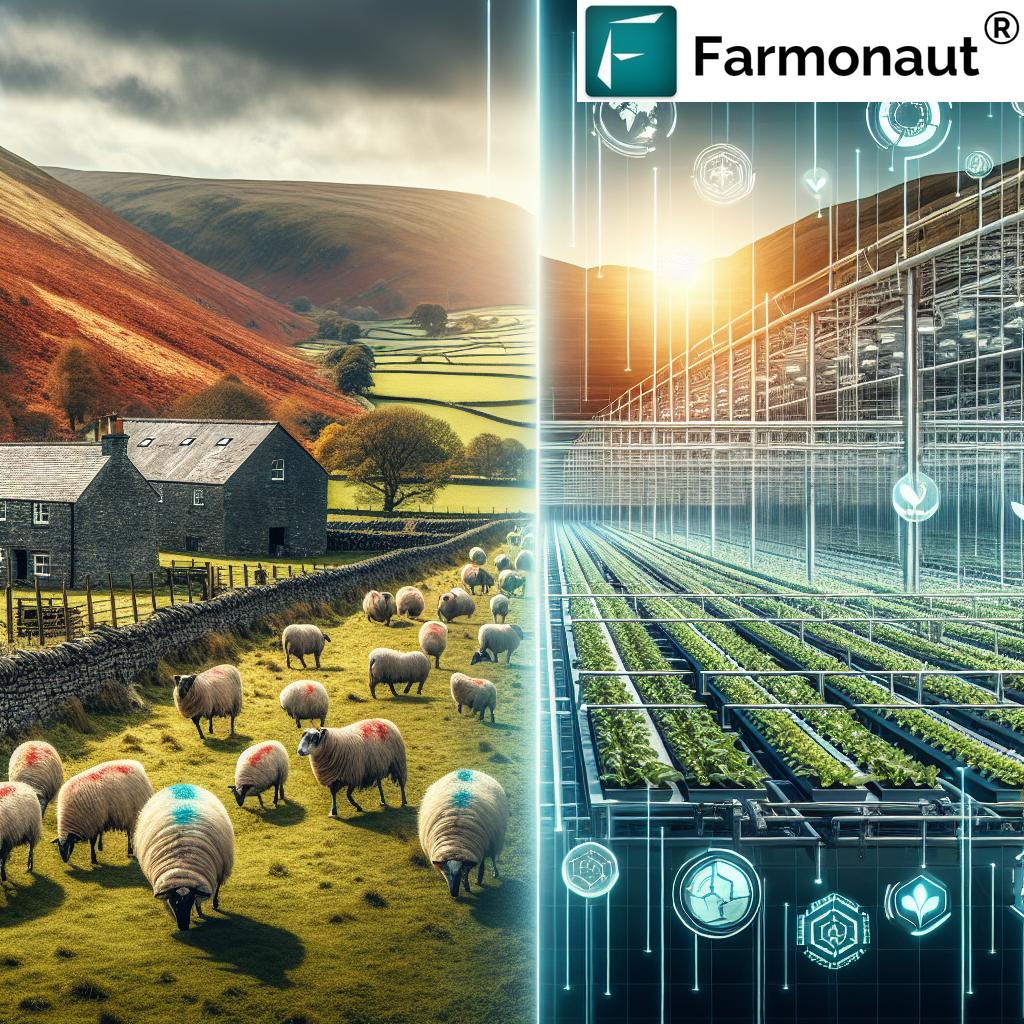
Addressing Labour Shortages Through Technology
One of the most pressing challenges facing UK agriculture is the shortage of labour, particularly seasonal workers. While technology cannot completely replace human workers, it can significantly alleviate the pressure:
- Automated Machinery: Advanced tractors, sprayers, and harvesters equipped with GPS and AI can operate with minimal human intervention, increasing efficiency and reducing labour requirements.
- Robotic Systems: From milking robots in dairy farms to fruit-picking robots in orchards, automation is increasingly filling labour gaps.
- Drone Technology: Drones equipped with multispectral cameras can quickly survey large areas, helping farmers identify issues that would traditionally require manual inspection.
- Data-Driven Scheduling: By leveraging precise crop growth data, farmers can optimize their scheduling of labour-intensive tasks like harvesting, ensuring maximum efficiency of available workforce.
Farmonaut’s satellite-based monitoring and AI-driven insights play a crucial role in this technological transformation, providing the data foundation upon which many of these labour-saving technologies rely.
Enhancing Supply Chain Resilience
The vulnerabilities in UK food supply chains have been starkly exposed in recent years. Agritech solutions are playing a vital role in strengthening these chains:
- Improved Forecasting: Advanced analytics and AI models help predict crop yields and market demands more accurately, enabling better planning throughout the supply chain.
- Traceability: Blockchain-based systems, like those offered by Farmonaut, provide end-to-end traceability, enhancing food safety and consumer trust.
- Inventory Management: Real-time data on crop health and growth stages allows for more precise inventory management, reducing waste and improving efficiency.
- Adaptive Logistics: Data-driven insights enable more flexible and responsive logistics, helping to mitigate disruptions caused by factors like weather events or labour shortages.
By leveraging these technologies, UK agriculture can build more resilient, transparent, and efficient supply chains, better equipped to withstand future shocks and challenges.
The Role of Government and Policy
The transformation of UK agriculture through technology cannot happen in isolation. Government policies and support play a crucial role in facilitating this transition:
- Investment in Infrastructure: Improving rural broadband and 5G connectivity is essential for the widespread adoption of agritech solutions.
- Research and Development Funding: Increased investment in agricultural research and technology development can accelerate innovation in the sector.
- Education and Training: Programs to upskill farmers and agricultural workers in the use of new technologies are vital for successful adoption.
- Regulatory Framework: Developing appropriate regulations for new technologies, such as drones and autonomous machinery, is crucial for their safe and effective implementation.
- Incentives for Adoption: Financial incentives or tax breaks for farmers investing in agritech solutions can accelerate the transition to more resilient and sustainable practices.
As the UK government continues to shape its post-Brexit agricultural policy, integrating support for agritech adoption will be crucial in building a more resilient and competitive farming sector.
The Future of UK Agriculture: Challenges and Opportunities
As we look to the future of UK agriculture, it’s clear that the sector stands at a crossroads. The challenges are significant, but so too are the opportunities presented by technological innovation. Here’s a glimpse into what the future might hold:
- Increased Automation: From autonomous tractors to AI-driven crop management systems, automation will play an increasingly significant role in UK farming.
- Data-Driven Decision Making: The integration of big data analytics and AI will enable more precise and efficient farming practices, optimizing everything from planting schedules to harvesting times.
- Vertical and Urban Farming: As pressure on land use increases, innovative farming methods like vertical farming could become more prevalent, especially near urban centers.
- Sustainable Intensification: Technologies that allow for increased production while minimizing environmental impact will be crucial in meeting food demand sustainably.
- Diversification: Many farms may diversify their operations, incorporating agritourism or renewable energy production alongside traditional farming activities.
In this evolving landscape, platforms like Farmonaut will play a crucial role in providing the technological foundation for these advancements. By offering accessible, affordable precision agriculture solutions, Farmonaut is helping to democratize access to cutting-edge agritech, enabling farms of all sizes to benefit from these innovations.
Comparative Analysis: UK Agricultural Challenges and Farmonaut Solutions
| Challenge | Impact on UK Agriculture | Farmonaut’s Solution |
|---|---|---|
| Labour Shortages | 67% of farms struggling to find workers, leading to reduced productivity | AI-driven automation and precision farming tools to optimize workforce efficiency |
| Equipment Innovations | 50% of farms report difficulties with equipment acquisition/maintenance | Integration with smart machinery for optimized use and maintenance scheduling |
| Precision Agriculture Adoption | Only 25% of UK farms currently use precision agriculture techniques | Affordable, satellite-based crop monitoring and AI advisory systems |
| Supply Chain Disruptions | Increased volatility in food prices and availability | Blockchain-based traceability and predictive analytics for supply chain optimization |
| Climate Change Effects | Potential 30% reduction in crop yields due to extreme weather events | Real-time weather monitoring and adaptive crop management strategies |
Conclusion: Building a Resilient Future for UK Agriculture
The challenges facing UK food supply chains and agriculture are undoubtedly formidable. From labour shortages to climate change, from market volatility to technological disruption, the sector is navigating a complex and ever-changing landscape. However, as we’ve explored in this blog post, innovative agritech solutions, exemplified by platforms like Farmonaut, offer a pathway to enhanced resilience and sustainability.
By embracing precision agriculture techniques, leveraging data-driven insights, and adopting smart farming technologies, UK farmers can not only address current challenges but also position themselves at the forefront of a global agricultural revolution. The integration of satellite monitoring, AI-driven analytics, and blockchain-based traceability has the potential to transform every aspect of farming, from crop management to supply chain optimization.
As we look to the future, it’s clear that the success of UK agriculture will depend on its ability to adapt and innovate. Government support, continued investment in research and development, and a commitment to sustainable practices will all play crucial roles in this transformation. Platforms like Farmonaut, with their focus on making advanced agritech solutions accessible and affordable, will be key enablers in this journey.
The road ahead may be challenging, but with the right tools, technologies, and mindset, UK agriculture can emerge stronger, more resilient, and better equipped to ensure food security for generations to come. As we continue to navigate these unprecedented times, let us embrace the power of innovation to build a sustainable and prosperous future for UK farming.
FAQs
- What are the main challenges facing UK food supply chains?
The main challenges include labour shortages, climate change impacts, market volatility, technological adaptation, and post-Brexit trade uncertainties. - How can precision agriculture help UK farmers?
Precision agriculture can optimize resource use, increase crop yields, improve climate resilience, and help offset labour shortages through data-driven decision-making and automation. - What role does Farmonaut play in enhancing agricultural resilience?
Farmonaut provides satellite-based crop monitoring, AI-driven advisory systems, and blockchain-based traceability solutions that help farmers optimize their operations and build more resilient supply chains. - How is technology addressing labour shortages in UK agriculture?
Technology is helping through automated machinery, robotic systems, drone technology for crop monitoring, and data-driven scheduling to optimize workforce efficiency. - What policy changes are needed to support UK agriculture’s technological transition?
Key areas include investment in rural digital infrastructure, increased R&D funding, education and training programs, appropriate regulatory frameworks for new technologies, and incentives for agritech adoption.
Farmonaut Subscriptions
For more information on Farmonaut’s API solutions, visit our API page or check out our API Developer Docs.





